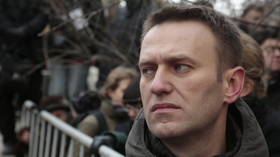From Russian nationalist agitator to darling of Western liberals: Who was Alexey Navalny?
The politically minded blogger wore many hats over a career that spanned two decades

Alexey Navalny collapsed and died on Friday, in a prison colony north of the Arctic circle where he was serving a 19-year sentence for extremist activities. He was 47. In the West, he enjoyed the reputation of a Kremlin critic and Russian “opposition leader.” In Ukraine, he was denounced as a Russian nationalist. In Russia itself, his legacy is at best complicated.
Born in 1976, Navalny graduated from law school in 1998 and earned a degree in finance in 2001. He would go on to dabble in law, investments and activism during his career, but kept coming back to politics.
“I have always been obsessed with politics,” he told the outlet Kommersant-Money in 2009.
The nationalist phase
Between 2000 and 2007, Navalny was a member of the liberal Yabloko party, before co-founding an ethnic nationalist movement called ‘Narod.’ He appeared in two notorious YouTube videos for the movement, one advocating for gun rights to fight “flies and cockroaches” (while showing Muslims), and another comparing immigrants to tooth decay.
In August 2008, Navalny spoke approvingly of the Russian intervention against Georgia on behalf of the beleaguered South Ossetia. He went on to participate in three annual ‘Russian March’ rallies with advocates for ethnic nationalism. Activist Evgenia Albats later said she had urged Navalny to join the marches as a way to leverage ethnic nationalism against the Kremlin. In 2010, Albats would co-sponsor Navalny’s six-month stay in the US through the Yale World Fellows program.
The anti-corruption blogger
By that point, Navalny had already called on his finance expertise to launch an investment activist group called “Union of Minority Shareholders,” which tried to shake down major companies such as Rosneft, Gazprom, Lukoil, and others. His umbrella NGO network, the Anti-Corruption Foundation (FBK), was registered in September 2011. Navalny would continue accusing the government in Moscow, regional governors and corporations of fraud, graft and corruption – often getting sued for defamation in the process.
‘Opposition leader’
By February 2011, Navalny was dabbling in politics as well. He attacked the ruling United Russia party as a collection of “crooks and thieves,” and in December claimed it had stolen the national elections. Western media dubbed him the “Russian opposition leader” after he gave a series of speeches at anti-government protests that followed.
The high point of Navalny’s political career was the July 2013 election for mayor of Moscow, when he won 27.24% of the vote but lost to Sergey Sobyanin. His attempt to run in the 2018 presidential election was blocked due to his criminal record.
The Kirovles and Yves Rocher cases
Navalny’s first criminal conviction was for embezzlement from Kirovles, a state forestry company. In 2013, he was sentenced to five years in prison, but this was later changed to probation. The European Court of Human Rights (ECHR) said in 2016 that his actions had been “indistinguishable from legitimate business activities.”
At the trial, Navalny denounced the charges as politically motivated and railed against the “disgusting feudal system” in which “one hundred families” were allegedly looting Russia.
Navalny and his brother Oleg – a postal employee – faced more charges of embezzlement in 2012, for defrauding the Russian branch of the French cosmetics giant Yves Rocher. The brothers were found guilty in December 2014, but Alexey once again received only probation.
In 2019, the Russian government labeled Navalny’s FBK a “foreign agent,” severely limiting its activities.
2020 ‘poisoning’ and arrest
In August 2020, Navalny fell ill on a flight from Tomsk to Moscow and was transported to Germany for treatment. Western doctors alleged he had been targeted with a ‘Novichok’ nerve agent, which Moscow rejected as a “provocation.” Upon returning to Russia, Navalny was arrested for breaching the terms of his probation and sent to a prison colony.
He was hit with additional charges of fraud and contempt of court, receiving an additional nine-year sentence in 2022. In August 2023, Navalny was sentenced to another 19 years behind bars on charges of fomenting, financing and carrying out extremist activities and “rehabilitating” Nazi ideology. The FBK was shuttered on government orders.
In December 2023, Navalny was transferred to a penal colony in the Yamalo-Nenets Region of northern Siberia. The cause of his death on Friday is still under investigation.
https://www.rt.com/russia/592561-alexey-navalny-blogger-opposition/



0 Comments:
Post a Comment
Subscribe to Post Comments [Atom]
<< Home